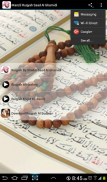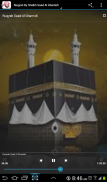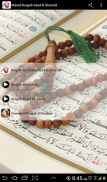





Ruqya MP3 By Saad Al Ghamidi

Descripción de Ruqya MP3 By Saad Al Ghamidi
Ruqya refers to the recitation of some specific verses from the Holy Qur’an or to make supplication using words that are mentioned in the Hadith of Prophet Mohammad (saw). Ruqya can be described as a spiritual healing prayer in which verses from the Holy Qur’an or the supplications from the Prophet are used in order to heal oneself or somebody else from sickness and evil eye.
Ruqya is a Sunnah of our beloved Prophet Mohammad (saw). He used to recite ruqyah for himself whereas some of his companions (Sahaaba) used to recite ruqyah for themselves. We know for a fact that the Holy Quran has been sent down on earth as a guide and cure to all human beings. Allah (swt) has said in the Quran that Allah (swt) says in the Quran, ‘We send down (stage by stage) in the Quran that which is a healing and mercy to those who believe’.
Allah (swt) says in the Quran ‘If a suggestion from Satan assails thy (mind), seek refuge with God; for He heareth and knoweth (All things), and ''And when I am ill, it is He who cures me’. Allah (swt) also says in the Quran, ‘We send down from the Quran that which is a healing and mercy for those who believe”.
These verses from the Quran ascertain that Allah (swt) has told his followers to use the words from his Quran to cure us of all evils and illnesses. This treatment is known as ruqyah.
There is ample evidence from the ahadith that prove the significance of ruqya in Islam.
Sahih Bukhari Hadith (Volume 7, Number 634) narrated Aisha (RA) Prophet Mohammad (saw) ordered me or somebody else to do Ruqya in case there was a danger from an evil eye.
Sahih Bukhari Hadith (Volume 7, Number 631) Narrated 'Aisha (RA): During the Prophet's (saw) serious illness, he used to recite the Mu'auwidhat (Surat An-Nas and Surat Al-Falaq) and then blow his breath over his body. When his pain became intense, I used to recite those two Suras and blow my breath over him and make him rub his body with his own hand for its blessings." (Ma'mar asked Az-Zuhri: How did the Prophet (prayers and peace be upon him) use to blow? Az-Zuhri said: He used to blow on his hands and then passed them over his face.) Hazrat Ayesha (ra) also said that, ‘Prophet Mohammad (saw) instructed me and everybody else to do Ruqya in case of danger from evil eye’
The significance of Surah Fatiha in ruqyah healing:
Besides being called Al-Hamd, As-Salah, Ash-Shifa and Umm al-kitab Surah Fatiha is also called Ar-Ruqyah (remedy), because there is the narration in the Sahih of Abu Sa`id telling the story of a Sababa/ Companion of the Prophet (saw) who used Al-Fatihah as a cure for the tribal chief who was stung by a scorpion. Later on, Prophet Mohammad (saw) said to a Companion,
"How did you know that Surah Fatiha is a Ruqyah?"
Some commentators opined that the focal point of healing powers of Surah Fatiha is in the power and blessings of the words: “Thee we worship(iyyaka na`budu), and Thy help we seek (iyyaka nasta`in)” The words, worship(na’budu) and help (nasta`in) have been understood to be the strongest elements for the most effective cure. In these lines we directly plead for help from the Allah (swt) (al-Shafi) whom we completely trust for recovery. This is why surah al-fatihah is one of recommended surah to be recited for ruqyah.
In Bab Fadl Fatihat al-Kitab of Kitab Fada`il al-Quran, Imam Bukhari reported that: Narrated Abu Sa'id Al-Mu'alla, ‘Once when I was praying the Prophet (saw) called me but I did not respond to his call. Later on I said, "O Allah's Apostle! I was praying." He said, "Didn't Allah say: 'O you who believe! Give your response to Allah (by obeying Him) and to His Apostle when he calls you'?" (8.24). He then said, "Shall I not teach you the most superior Surah in the Qur'an?" He said, '(It is), 'Praise be to Allah, the Lord of the worlds. '(i.e., Surat Al-Fatiha) which consists of seven repeatedly recited Verses and the Magnificent Qur'an which was given to me.
Ruqya refiere a la recitación de algunos versículos específicos del Corán o para formar palabras utilizando súplica que se mencionan en el Hadiz del Profeta Muhammad (saw). Ruqya puede ser descrito como una oración de sanación espiritual en la que los versos del Corán o las súplicas del Profeta se utilizan con el fin de curar a sí mismo oa otra persona de la enfermedad y el mal de ojo.
Ruqya es una Sunnah de nuestro amado Profeta Muhammad (saw). Él solía recitar ruqyah para sí mismo, mientras que algunos de sus compañeros (sahaaba) solía recitar ruqyah por sí mismos. Sabemos a ciencia cierta que el Sagrado Corán ha sido revelado en la tierra como una guía y la cura a todos los seres humanos. Allah (swt) dice en el Corán que Allah (swt) dice en el Corán: "Hemos hecho bajar (paso a paso) en el Corán que es una sanación y la misericordia a los que creen".
Allah (swt) dice en el Corán: "Si una sugerencia de Satanás asalta tu (mente), buscan refugio en Dios; porque Él oye y sabe (todas las cosas), y '' Y cuando estoy enfermo, es Él quien me cura '. Allah (swt) también dice en el Corán: "Hemos hecho bajar del Corán lo que es curación y misericordia para los creyentes".
Estos versos del Corán cerciorarse de que Allah (swt) ha dicho a sus seguidores a usar las palabras de su Corán para curarnos de todos los males y enfermedades. Este tratamiento se conoce como ruqyah.
Existe amplia evidencia de los hadices que demuestran la importancia de ruqya en el Islam.
Sahih Bukhari Hadith (Volumen 7, Número 634) narró Aisha (RA) Profeta Muhammad (saw) a mí oa alguien más que hacer ruqya en caso de que existía el peligro de un mal de ojo ordenó.
Sahih Bukhari Hadith (Volumen 7, Número 631) Narrado 'Aisha (RA): Durante una enfermedad grave de la (saw) del Profeta, solía recitar el Mu'auwidhat (Surat An-Nas y Surat Al-Falaq) y luego soplar el aliento por encima de su cuerpo. . Cuando el dolor se intensificó, solía recitar esos dos Suras y soplar el aliento sobre él y hacer que él frote su cuerpo con su propia mano por sus bendiciones "(Ma'mar preguntó Az-Zuhri: ¿Cómo hizo el Profeta (oraciones y ? la paz sea con él) utiliza para soplar Az-Zuhri dijo: Él solía soplar en sus manos y luego las pasó sobre su cara) Hazrat Ayesha (ra) también dijo que, "Profeta Mohammad (saw) yo y todos los demás instruyó. hacer ruqya en caso de peligro del mal de ojo '
La importancia de la Sura Fatiha en la curación ruqiah:
Además de ser llamado Al-Hamd, As-Salah, Ash-Shifa y Umm al-Kitab Sura Fatiha también se llama Ar-la Ruqyah (remedio), porque no es la narración en el Sahih de Abu Sa'id que cuenta la historia de un Sababa / Compañero del Profeta (saw) que utiliza Al-Fatiha como una cura para el jefe de la tribu que fue picado por un escorpión. Más tarde, el Profeta Muhammad (saw) dijo a un compañero,
"¿Cómo sabías que Sura Fatiha es la Ruqyah?"
Algunos comentaristas opinaron que el punto focal de los poderes curativos de la Sura Fatiha está en el poder y las bendiciones de las palabras: "Te adoramos (iyyaka na`budu), y Tu ayuda que buscan (iyyaka nasta`in)" Las palabras, la adoración (na'budu) y la ayuda (nasta`in) han entendido que son los elementos más fuertes para la cura más efectiva. En estas líneas suplicamos directamente para la ayuda del Allah (swt) (al-Shafi) quienes confiamos por completo para la recuperación. Esta es la razón por la sura al-Fatiha es una de sura recomendada para ser recitada por ruqyah.
En Bab al-Fadl Fatihat Kitab del Kitab al-Fada`il Corán, el Imam Bukhari reportó que: Narró Abu Sa'id Al-Mu'alla, 'Una vez, cuando estaba orando al Profeta (saw) me llamó, pero yo no respondo a su llamado. Más tarde le dije: "O Apóstol de Alá! Yo estaba orando." Él dijo: "¿No Alá dice: '¡Oh vosotros que creéis Dé su respuesta a Allah (obedeciéndole) ya Su Enviado, cuando te llama" (8.24). Entonces él me dijo: "¿Queréis que os enseñe la Sura más superior en el Corán?" Él dijo: "(Es), 'Alabado sea Allah, el Señor de los mundos. '(es decir, Surat Al-Fatiha), que consta de siete recitó varias veces Versos y el Magnífico Corán que fue dado a mí.

























